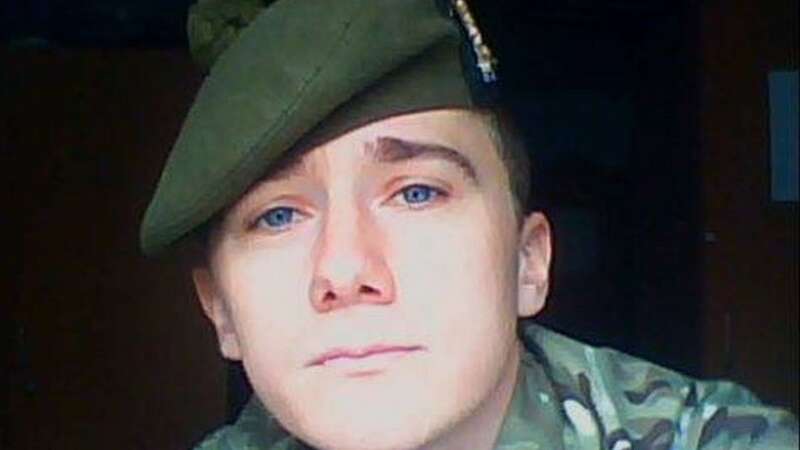
The Ministry of Defence (MoD) has been slapped with a “Crown Censure” by the Government’s health and safety watchdog after a soldier was fatally shot in the head during training.
The Health and Safety Executive (HSE) blasted the MoD’s “ineffective” management and “poor” planning and conducting of the training mission where Conor McPherson, 24, died.
A private in the Black Watch, 3rd Battalion, the Royal Regiment of Scotland, Conor lost his life during a training exercise at the Heely Dod firing range in Otterburn, Northumberland on August 22, 2016.
He was part of a team of five who had been shooting at remote-controlled targets as they manoeuvred on foot through the moorland firing range. The group were using live rounds and night vision gear at the time.
At around 11pm Conor was accidentally shot in the back of the head by a fellow soldier, he died at the scene. Following investigations by Northumbria Police and the Royal Military Police, the HSE was handed jurisdiction in December 2020.
 Inside WW1 military hospital abandoned for decades before new lease of life
Inside WW1 military hospital abandoned for decades before new lease of life
Their investigation into the incident found the Army had failed to properly implement a safe system of work for the exercise. In a statement released today, the HSE said: “The planning and conducting of the exercise was poor, and there was an ineffective system to monitor the management arrangements mandated within the MoD’s own procedures. Mandated planning meetings in the lead-up to the exercise were not attended by some staff.
“Errors were made while producing written instructions and some staff lacked confidence while producing them. The finalised written instructions differed from how the exercise was being conducted. There should have been an additional supervisor with the firers on the night of the incident, due to the soldiers’ lack of experience when carrying out nighttime firing.
“Mandated ‘night time’ specific safety tasks were not carried out prior to firing commencing. Incorrect and unauthorised night vision equipment was being used by some soldiers. Officers who were not sufficiently experienced in controlling such an activity were not properly mentored or supervised to deal with an exercise of such complexity.”
Neil McPherson, Conor’s father, said in his victim's personal statement: “Conor was a model son. He did not drink or smoke and he loved his family life. He loved books and his PC games and Saturday night films on TV.
“On the night Conor died, it was every parents’ worst nightmare. A knock at the door, two men in suits bearing news that we had lost our son. I think we both went into shock but the memories of it all are blurred.
“The future is one of deep sorrow. Not to see Conor grow and find love and give us grandchildren is very sad. He would have been a fabulous father and as our only son there is no one to carry on the family name.”
Mr McPherson added: “Socially, I don’t go out much anymore and Betty (Conor’s mother) hardly ever goes out socially except for a meal. I myself could not go back to work after Conor’s death. I don’t think I want to work anymore as I tend to shun being around groups of people. Betty and I have many pictures that to date, I cannot bear to look at although we often reminisce together. We also both have one of Conor’s dog tags each which we wear on a chain.”
The MoD cannot face prosecution in the same way as non-Government bodies and a Crown Censure is the maximum sanction for a government body that HSE can bring. There is no financial penalty associated with Crown Censure, but once accepted it is an official record of a failing to meet the standards set out in law.
HSE inspector Jonathan Wills said: “Our thoughts are with the family of Private McPherson, with whom we have remained in close contact. Just like any other employer, the MoD has a responsibility to reduce dangers to its personnel, as far as it properly can.”
This HSE Crown Censure was brought by HSE enforcement lawyer Kate Harney and supported by HSE paralegal officer Rebecca Farman. By accepting the Crown Censure, the MoD (Army) has admitted breaching its duty under Section 2(1) of the Health and Safety at Work etc. Act 1974 and Regulation 5 of the Management of Health and Safety at Work Regulations 1999.
 Brighton beach evacuated as bomb squad blow up 'World War 2 shell' near pier
Brighton beach evacuated as bomb squad blow up 'World War 2 shell' near pier
Lieutenant General Dame Sharon Nesmith DCB Deputy Chief of the General Staff (DCGS) said in a statement: “I, on behalf of the Army, am deeply sorry for failing Pte Conor McPherson. I unreservedly apologise to his family for Conor's tragic death in a training accident on 22 August 2016.
“We 100 per cent accept the Health and Safety Executive findings. We failed to plan, organise, control and monitor the critical safety aspects of this live firing training event.
“Whilst live firing is complex and risky, Conor's death was preventable. We care hugely about our soldiers - above all else their health and wellbeing - on this occasion we got it wrong. Very wrong.
“We have addressed each of the failings cited in the Crown Censure. We took action in the immediate aftermath and have continued to apply lessons since. I, as the Army Safety Champion, am committed to driving the necessary change to reduce all training risk to the lowest possible level.
“We very much regret Conor's death. His legacy will be our continual drive to do better. On behalf of the MOD and the Army, I offer my sincere condolences to his family and friends."
Read more similar news:
Comments:
comments powered by Disqus
































